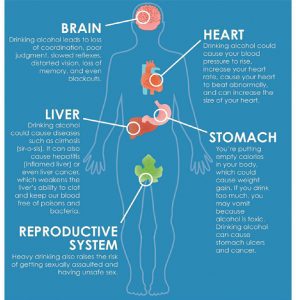ALCOHOL’S NEGATIVE EFFECTS


The liver is one of the most important organs affected by alcohol consumption. The liver processes alcohol and removes it from the body, but excessive drinking can damage the liver, leading to a range of problems, including fatty liver disease, hepatitis, and cirrhosis. Fatty liver disease occurs when fat accumulates in the liver, which can cause inflammation and scarring. Hepatitis is an inflammation of the liver, which can be caused by excessive alcohol consumption. Cirrhosis is a chronic disease that results in scarring of the liver, which can lead to liver failure.
Excessive alcohol consumption can also have negative effects on the digestive system. Alcohol irritates the lining of the stomach and can cause inflammation, which can lead to ulcers and other digestive problems. Heavy drinking can also cause inflammation of the pancreas, which can lead to pancreatitis, a serious and potentially life-threatening condition.
Alcohol can also have negative effects on the cardiovascular system. Excessive drinking can cause high blood pressure, which can lead to heart disease and stroke. Alcohol can also cause an irregular heartbeat, which can increase the risk of heart attack and stroke. Heavy drinking can also lead to the development of a condition known as alcoholic cardiomyopathy, which is a weakening of the heart muscle.
Alcohol consumption can also affect the brain and nervous system. Alcohol is a depressant, which means it slows down the activity of the central nervous system. This can cause a range of effects, including impaired judgment, memory loss, and difficulty with coordination and balance. Long-term heavy drinking can also cause a range of neurological problems, including dementia, peripheral neuropathy, and Wernicke-Korsakoff syndrome.
In addition to these effects, alcohol consumption can also have negative effects on mental health. Alcohol is often used as a coping mechanism for stress and anxiety, but excessive drinking can actually make these problems worse. Alcohol can also cause mood swings and irritability, and can increase the risk of depression and suicide.
There are also a range of other negative effects associated with alcohol consumption. For example, alcohol can cause dehydration, which can lead to headaches, dizziness, and fatigue. Alcohol can also impair the immune system, making it harder for the body to fight off infections and illnesses. And of course, excessive drinking can lead to alcohol poisoning, which can be life-threatening.
Given these potential risks, it is important to be aware of the amount of alcohol you are consuming, and to drink in moderation. The Centers for Disease Control and Prevention recommends that men consume no more than two drinks per day, and that women consume no more than one drink per day. However, it is important to remember that these guidelines are just that – guidelines. The amount of alcohol that is safe for you to consume depends on a range of factors, including your age, weight, and overall health.
If you are concerned about the amount of alcohol you are consuming, there are a range of resources available to help. Your doctor or a mental health professional can provide advice and support, and there are a range of support groups and online communities for people struggling with alcohol addiction.
Alcohol consumption can have a range of negative effects on the organs and body, including the liver, digestive system, cardiovascular system, brain and nervous system, and mental health. To reduce the risks associated with alcohol consumption, it is important to be aware of the amount of alcohol you are consuming, and to drink in moderation. If you are struggling with alcohol addiction, there are a range of resources available to help, and seeking support is an important step.
If you are looking for a team of medical professionals to talk to you about your health, the team at Well-Being Medical Center in Naples is available and ready to help. They offer a wide variety of services including preventative care, health consultations, and pride themselves on patient satisfaction.
Contact Well-Being Medical Center of Naples today at (239) 315-7801.
Dr. Ricardo Martinez
Dr. Ricardo Martinez is an internist in Naples, FL and is affiliated with NCH Baker Hospital. He received his medical degree from Superior Institute of Medical Sciences of Santiago de Cuba and has been in practice 20 years. He also speaks multiple languages, including Spanish. He specializes in hospital medicine, ambulatory care and is experienced in hospice and palliative medicine, bariatric medicine, diabetes mellitus, food allergy, and infectious disease. As of March 16th, 2020, Dr. Martinez has founded Well-Being Medical center in Naples Florida. He is looking forward to providing Medical care within primary care settings and urgent care service throughout the Naples Florida area.
239-315-7801
www.well-beingmedicalcenter.org
851 5th Ave. N. Suite 102, Naples, FL 34102
 Southwest Florida's Health and Wellness Magazine Health and Wellness Articles
Southwest Florida's Health and Wellness Magazine Health and Wellness Articles

